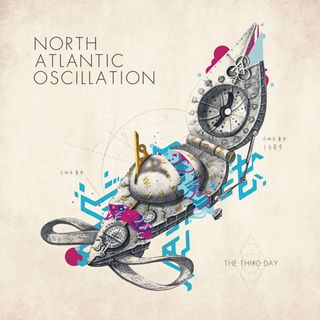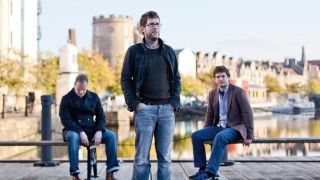With appropriately titled third record The Third Day, North Atlantic Oscillation have made their most confident artistic statement yet. The album confounds expectations after 2012’s gorgeously hazy Fog Electric, seeing a return to the eclecticism upon which they originally built their name.
Broadly taking a similar tack to the subtle electronica and shoegaze stylings of early Caribou or Boards Of Canada and melding it with the eccentric left-field pop of cult heroes Grandaddy, or stadium weirdos Flaming Lips, their music has always been hard to categorise. Accepted into the Kscope family prior to their debut EP, 2009’s Callsigns, they’ve proved prolific, releasing three albums in five years, as well as a solo record, Sand, from frontman Sam Healy. NAO are far from your average experimental band, yet their fiercely intelligent, intricately layered music remains a cult proposition, and they have even toured with the likes of Bob Mould, Engineers and Blackfield.

“Everyone was predicting that our music would end up on the same shelf as Flaming Lips and Grandaddy, maybe Elbow, but it didn’t transpire that way,” reveals Healy, battling the telephone on an unseasonably windy August afternoon in Edinburgh (“I think technically it’s a gale today,” he apologises). “I’m not really sure I could name one demographic that the bulk of our listeners are in.”
Due to their label and early support in progressive circles, they’ve built up something of a reputation as a progressive band, or a post-progressive band, if not a true ‘prog’ act. This distinction hasn’t overly bothered Healy though. “Prog fans tend to buy albums instead of nicking them!” he laughs, before observing: “We’re not prog because I’m not good enough to play guitar solos!” Nor is he classically trained. “That leaves a lot of prog boxes unticked…” Luckily, he thinks the majority of NAO listeners are pretty open-minded. And anyway, “It doesn’t matter – if I like it, I like it.”
Their first album, Grappling Hooks, was a mighty kitchen-sink affair that touched on angular alt-rock, left-field pop, electronica, post-rock and even jazz fusion. Despite – or perhaps because of – this eclecticism, it was championed by Zane Lowe on Radio 1 and was named album of the week, as well as being rapturously received by various mainstream outlets.
This apparent success notwithstanding, the band have mixed feelings about their debut, with Healy explaining: “I can couch it in self-confident musician’s words, but the fact is we just weren’t as good as a band back then. The first album was all of the tracks that we had been working on that we thought were worthy of recording, and they were maybe a bit more primitive, less intricately arranged and simplistic.”
For second album Fog Electric, they abandoned this approach in favour of something more focused, more conceptual and yet opaque, both in the shoegazey walls of guitar and the lyrical content. With the lyrics, Healy says: “The songs were very much about things – they were a little hidden but you could probably figure out what they were about. Even when there’s a specific theme to a song, I tend to avoid things that would make it totally clear what’s going on.” He prefers to write in a more impressionistic style, rather than the Ray Davies school of ‘story lyrics’.
As he explains: “It’s more like a conversation between you and the songwriter, rather than the songwriter going, ‘This is what it’s about.’” The Third Day, on the other hand, is perhaps much more reminiscent of their debut – punchy, immediate and attention-grabbing. Healy describes a lengthy process of trying to identify what was annoying him about Fog Electric, and reveals that they’ve since departed from their more post-rock or shoegaze leanings: “I still like shoegaze and it’s one of my favourite genres,” he’s quick to say.
However, working on the rockier Sand album gave him the confidence to strip back the oblique: “Just to see if we could do it.” On the new record, Healy agrees that a conscious effort went on creating more clarity for the listener, but that, ironically, the tracks ended up being even more complex than before. “It might feel sparser because there’s been care taken with the mix to make whatever needs to be in the foreground as clear as possible.”
This is at the core of the new album – the confidence to bring elements to the fore. Healy explains: “I just realised that I like melodies, that I was maybe kind of running away from melodies because I thought that the band should be more… not unapproachable, but I felt that the overall tone for Fog Electric, which I had in my head before writing it, seemed a bit bleaker, darker and less amenable to melodies and pop sensibilities.
“With the Sand album, one of the things I’m reasonably happy with is that some of the themes are quite dark, but they’re still wrapped up in pretty melodies or a nice vocal or harmony. That was something I wanted to come back to – pop, I guess.”
As always, the studio has been a key weapon in the NAO arsenal on The Third Day. Healy candidly admits: “With all the layers we use, it’s something that would just be literally impossible in the old analogue days.” So complicated are their songs that he took to keeping a rough tally of how many virtual tracks there were on each recording, with Dust, the second-to-last track, topping the list. “That’s the most complicated track we’ve ever done – 120 to 130 separate tracks, I think.”
Part way during composition, his computer crashed under the weight of processing required and ultimately, Dust had to be rescued one track at a time over the course of two arduous days before work could continue. It might come as no surprise, but with this much effort put into their work, NAO aren’t particularly intimidated by the number of other bands out there, or too philosophical about releasing music using modern technology. NAO could not exist without “the democratisation of music” and contemporary methods for recording – Sand was almost completely recorded and produced by Healy, and The Third Day has been similarly hands-on as a result.
But despite these tools becoming available earlier this century, Healy says: “It’s no surprise that the world wasn’t flooded with wicked awesome music the next day. It’s a completely different axis of whether you can write songs versus your technical ability.”
Describing in greater depth how exactly the Sand project shaped The Third Day, Healy’s answer is at heart very simple – this album could not have happened had he not written Sand. “I would have found it quite difficult to get back into writing a third NAO album without having done that. I definitely felt like I needed an oblique strategy, like Brian Eno says, y’know?”
When pushed on what form this creative block took, he says it was not so much a block as fatigue. “There’s some quote from a filmmaker, I think it’s James Cameron actually, that a film is never finished, only abandoned. As in, once you run out of time, money or the will to do any more…”
It’s common for bands to talk of difficult albums – supposedly Radiohead have nearly broken up after writing and recording every album from OK Computer onwards – but Healy is quick to put his own struggles into context, saying that after every album he has a break from music, going so far as to pack away stuff for several months as soon as the masters are complete. “It’s refreshing to not think about music at all for a while,” he muses. What is it, then, that forces him to return to work? The answer is simple.
“After a sufficient time has gone by without having written something, I start getting antsy and weird and irritated and usually don’t recognise it for what it is at the start, before realising it’s probably that – then I can go back. Even if I don’t like it, I need it. It seems like it’s just something I have to do to maintain my sanity.” If all of this sounds rather dramatic, Healy remains upbeat about the creative process, attributing the angst of the musician as normal, and common to most creative pursuits – even if not every field recognises it.
“Douglas Hofstadter [a professor of cognitive science] is one of my favourite commentators on this. He maintains that there is no difference, creatively, in terms of the creative process – it’s almost identical between a mathematician and a musician. He’s not saying that music is maths, and I agree – I don’t think it is. I used to get asked that question a lot – when I write, do I write mathematically or numerically. Well, absolutely not. I’m not using any of that part of my brain so far as I can tell. “I think what Hofstadter meant was that the way you prime your brain for work, if you want to call it work, or the creative act, is the same.”
The Third Day is out on Kscope. See www.naoband.com for details.

